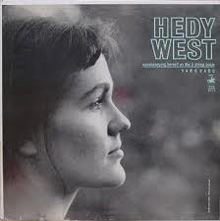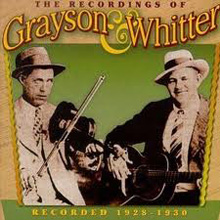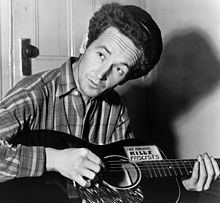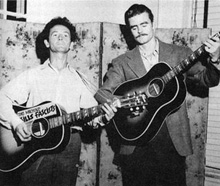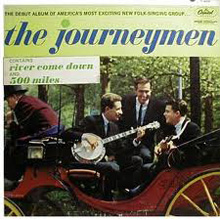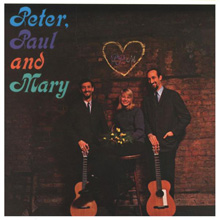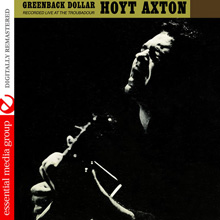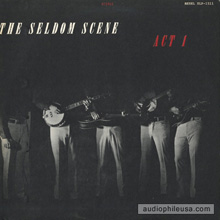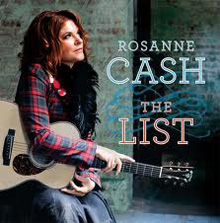500 Miles
Let us begin with someone else's beginning. Jim Moran has already offered us a very diverse sampling of performances of this song on his Comparative Video 101 blog. His intro is one part compliment, one part cautionary note:
Back when I was a brash rip of a young lad with a Silvertone guitar playing at high school parties and small coffee houses, I had a mental list of about ten or fifteen songs that I dreaded having people request. [...} The list included, Lord have mercy on us, a goodly number of Kingston Trio and Peter, Paul and Mary songs - not because the songs themselves weren't good, but rather because I had just gotten tired of playing them again and again and again. [...] Heading that list, I am now sad in retrospect to report, was "500 Miles."
Thusly forewarned, we note that there are a number of ways that one might overdo this song. One would be to geek out on its origins—its folk pedigree, as it were. I find myself peculiarly afflicted by this tendency and promise here and now not to visit it upon you.
Well, not too much. But look, Hedy West—to whom this song is most commonly attributed—herself came of solid, north Georgia folk stock. She was born late in the Great Depression to a father who was a trade union organizer, poet and old pal of Pete Seegar. Unlike many who climbed aboard the folk train rumbling through The Village in the early '60's, Hedy had traditional American folk music in her blood and bones. You can hear that in her original version of the song as clearly as you've ever heard a whistle blow.
Audio clip: Hedy West plays 500 Miles, from her Vanguard debut, 1963
Now, songs—like, say, apple trees—are often what plant geeks call "extreme heterozygotes," meaning that although they do get important genetic information from their parents, they don't necessarily look or taste much like them. Still, this song is the fruit of seed and a good deal of cross fertilization, and if ever there was a singer-songwriter who would have been familiar with that process, it was Hedy West.
She would have heard, for example some variety of Train 45, here performed by the dynamic duo of G.B. Grayson and Henry Whitter in 1927.
Audio Clip: Train 45, Grayson and Whitter,1927
...Or at least its ubiquitous modern variant, Reuben's Train. (Upon which the sainted Earl Scruggs claimed to have worked out his unique approach to playing banjo.) The Dillards included it on their debut, Back Porch Bluegrass in 1963, the same year as Hedy West's above.
Audio Clip: The Dillards, Reuben's Train
The discerning listener will notice not only the references to trains with really, really loud whistles, but the structural similarities of these mountain-music standards to what West crafted of them. (Or to stick with our apple tree metaphor, grafted onto them.) One big difference, of course, is that these more primitive varieties of the tune have distinctly modal melodies—that blend of minor and major modes that is hard to define (without going über-geek) but easy to recognize. Fear not—Peter, Paul and Mary will tidy that right up.
But first we note another song-strain that West may have tapped into (consciously or otherwise) when she penned this tune: the folk-ballad, 900 Miles. In a 1944 radio interview on the BBC, Woody Guthrie highlighted just how many variants of this song were already in circulation at that time.
Next song I'm gonna sing is one of the oldest, longest, lonesomest songs I heard. I heard this years ago...used to hear my dad sing it, and I heard Indians sing it, and Negroes sing versions of it. And, name of it's, 900 Miles From Home.
Woody's road-buddy and sometimes musical sidekick, Cisco Houston, recorded his version of the ballad for Folkways in the early 1950's, some 10 years before West. Which presumably gave her time to reduce her distance from home by 400 miles. Yes, Houston's singing it in a minor key and there are other difference we might focus on. But think of West's song as something of a collage. We're just rummaging through the musical fabric pile she had access to, is all.
Audio Clip: Cisco Houston sings 900 Miles
OK, my inner musicologist is well satisfied and thanks you for what he regards as a very, very brief indulgence. We move on now to indisputably recognizable versions of the song, and to the other way you could overdo it, namely, by offering up a multitude of recordings of it within a very short span of time. That span would have been roughly 1961 to 1964. During which time every folk group on the planet included this song on their debut recording.
We've already heard from West's and The Dillards' debuts, but I believe The Journeymen kicked things off in 1961. You may never have heard of them, but you've heard the group's members in other settings. If you find yourself experiencing an inexplicable desire to go to San Francisco and wear a flower in your hair upon hearing this next cut, that's because the lead vocal is covered by Scott McKenzie. The group also featured John Phillips before he co-founded the Mamas & the Papas. Pretty good music biz cred, that. And it shows.
Audio Clip: The Journeymen, 500 Miles
The debut recording that really matters here, though, was that of the most popular folk group of that most folk-filled era, Peter, Paul and Mary. Just for fun, we note that this record knocked Ray Charles' classic Modern Sounds in Country and Western Music off the Billboard's #1 spot. And, proving that the Fates do have a grand sense of humor, they were in turn knocked off that high ground by Alan Sherman's My Son, The Folk Singer. C'mon everybody, sing along now—to the tune of The Streets of Laredo:
As I wandered out on the streets of Miami
I said to mine-self, 'This is some fancy town...If 500 Miles was overdone for a time, so were at least half of the tunes Peter, Paul & Mary covered on that first album. It eventually sold over 2 million copies, one of them to my parents, and at 8 I could have sung you every song on it. So let's hear their version. Notice that although by now 500 Miles is settling into a recognizable form, the folk process has never really stopped having its way with it. PP&M do credit West, but use their own lyrics and chord progression.
Audio Clip: Peter, Paul and Mary on 500 Miles
Hoyt Axton's recording debut, released in 1962, was of a live performance at The Troubadour. Guess what song he included? If you think I'm going out in search of obscure versions of the song just to back up my debut theme, you're wrong. I've gone out in search of good recordings of the song in hopes that you'll be inspired to add it to your repertoire. Fortunately, this tune seems to bring out the tasteful in artists. It certainly did in the case of Axton. It doesn't get much more heartfelt and straightforward than this. See what you think.
Audio Clip: Hoyt Axton sings 500 Miles
Country singer Bobby Bare had a big hit with the song in 1963. It's easy to track down if you're interested, but I think that we—like the folks of that era—have drunk enough of the 1960-64 vintage. But lets make two more stops along these tracks we've been walking and we'll be home. The first is from the early 70's and will serve as indicative of the treatment this tune receives from what used to be called "progressive" Bluegrass bands. (Now I think they are just called "good".) As we saw above, pre-Hedy variants of the song have long been in the mountain music catalogue. But I believe it was The Seldom Scene who introduced it to the Bluegrass world on—you guessed it—their 1972 debut, Act 1.
Audio Clip: The Seldom Scene perform 500 Miles, 1972
500 Miles was brought back around for a post-millenium look and listen by virtue of its inclusion on Rosanne Cash's well-regarded 2009 release, The List, an album made up entirely of songs her daddy (yes, that would be Johnny) recommended to her as country classics she really ought to know. Cash (the Younger's) career was wrapping its third decade by that point so that album will break our lucky streak of debuts. But for that same reason it offers us a seasoned artist's take on what is by now a well-seasoned song. On this audio clip you don't hear any of her guitar, but videos available on the web show clearly that she fingers it in the same key as our arrangement (G) but capos up 3 frets, rendering it in Bb. Just in case your vocal range is anything like hers, I've included a Bb version of the song on our CD tracks devoted to the song. See? Sometimes a little guitar geekishness proves very practical.
Audio Clip: Rosanne Cash sings 500 Miles, from The List
All Community Guitar Resources text & material © 2006 Andrew Lawrence

